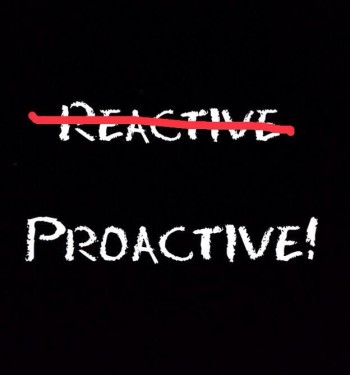 A lot of what we have talked about in our past entries like getting and following instructions, researching for information and resources; being resourceful and prepared can be summed up in one general characteristic-proactivity.
A lot of what we have talked about in our past entries like getting and following instructions, researching for information and resources; being resourceful and prepared can be summed up in one general characteristic-proactivity.
Proactivity is being action, results and change-oriented, anticipatory and self-initiating. If you’re proactive, you act in advance for a future situation instead of reacting to a situation when it happens. You do not need to be told what to do or be asked to do something. Simply put, being proactive means taking control and initiating change more than merely adjusting to the situation. It aims to identify and explore opportunities to be able to avoid potential problems.
Proactive employees are considered the most valuable because they are continuously on the move to do something; to act on things rather than sit around waiting for direct orders. They go forth and look for answers in preparation for, not in answer to and they go ahead and take on tasks head on if they know what to do and how to do it rather than wait to be told to do so. They ask questions in anticipation and in preparation for the future.
How to be Proactive
1) Predict, Plan and Prevent. Because being proactive is future-oriented, you must be able to anticipate what the future holds in terms of your work and problems that may arise and because you understand these possibilities, you work on the process, routines and practices of the present and combine these with your logic and creativity to be able to prevent future problems. These make work easier for you and your teammates.
2) Prioritize, Participate and Perform. More than being observers, proactive people are doers. They take initiative, contribute and get involved in coming up with solutions in a timely and efficient manner. They prioritize which are important, decide and work at goals now rather than later and hold themselves accountable, believing that working on these day-to-day tasks would also minimize their workload in the process.
3) Evaluate and automate procedures and processes. Depending on functionality, discard those that do not work, adjust what can be adjusted and think of ways on how to improve or automate processes to minimize time like using computer applications and delegating to team members tasks based on who are best fit for the requirements of the task.
4) Learn and Commit. Continuously develop a passion and interest for anything to improve work situations or yourself through company trainings, online courses or exposure to other tasks. Use these to commit yourself to excellence and be an asset to your company/client.
Because of the nature and scope of the work of Virtual Assistants (VA), they need to be proactive as they get to better manage their times and their tasks and are better able to serve clients when they take control of things they need to do. By taking note of things that they do regularly for each of their clients, considering the difference in time zone and nature of business, they would automatically be able to do these tasks without waiting for clients to constantly remind them. A proactive VA is prepared and as such, she rarely gets flustered nor is she always in a rush. She takes interest in the trends that could improve her clients’ businesses and service and consequently get to also improve her service. The proactive VA understands what needs to be done, how and at what cost, much like the client she is assisting and these can empower her to do her tasks and make decisions based on her knowledge of the business and the project. These makes the proactive VA more valuable to clients because the VA does not only get to work on more tasks on the specified hours but also shows the client that they care about their business. Clients also prefer proactive VAs and delegate more complex tasks because they know they can rely on them.
Businesses can also benefit from being proactive by setting goals and constantly looking out to better improve their systems, productivity, efficiency and standing in the market rather than wait for competitors to give them stiff competition by being complacent. Proactive businesses are cost-effective because they get to solve small problems before they even become big enough to cost a lot of time and money. Proactive businesses increase good results and cultivate positive workplace environment.
Proactive Virtual Assistants are always ahead of the game because they are constantly on their toes. They go out of their way to find out where they are at the moment and where they want to end up and work on these by developing processes and procedures and disciplined habits and going beyond what is expected of them, making them valuable partners of the client and their business.